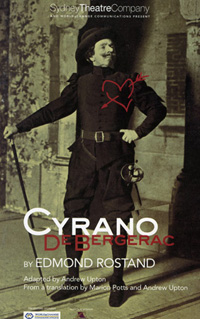« A romantic hero, right under our noses. »
 |

© Sydney Theatre Company.
|
 |
Mise en scène : Marion Potts
Première: le 6 octobre 1999
Dernière : le 30 novembre 1999
Traduction: Marion Potts & Andrew Upton
Adaptation : Andrew Upton
Costumes : Jennifer Irwin
Scénographie : Genevieve Blanchett
Lumières : Nick Schlieper
Compositeur : Andree Greenwell
Escrime et chorégraphie : Steve Douglas-Craig
Rôles et interprètes :
Justine Clark, Michael Denkha, Ronald Falk, Jack Finsterer, Nicholas Garsden, Mark Hennessey, Celia Ireland, Scott Johnson, Mark Kilmurry, Jillian O’Dowd, Jeremy Sims, John Trutwin, David Wicks.
Reviewed by Bryce Hallett
Edmond Rostand's Cyrano de Bergerac is 102 years old and it endures as one of the great stories of French literature: comical and romantic, noble and heroic, and proof of Bourgeois' words: "Nothing elevates the soul quite like a show!"
Rostand's free-flowing, witty verse has been adapted by Andrew Upton, and both he and the director, Marion Potts, have crafted a clear, purposeful translation that reinforces the play's anti-naturalistic leanings and brings its rich language into lively play. It is less idiomatic and colloquial than Neil Armfield and Geoffrey Rush's free-wheeling translation of Beaumarchais' The Marriage of Figaro, and yet, to my mind, the larrikin verve it inspires makes it a fitting companion.
There are no gimmicky excesses and, in the main, the staging works like a dream. Potts and Upton have taken care to keep the swashbuckling and comic jousting in harness, while giving the work's melodrama and emotions room tobreathe. In the confines of Wharf 1, the creative team solves the space problem using simple roll-away sets and various adornments, while Jennifer Irwin's costumes add texture and interest. The tale begins and ends in empty spaces, figures in repose or fighting death at the "blue threshold".
Like the arrival of a noisy carnival troupe, each act unfurls before our eyes in a flurry of activity accompanied by the musical fanfares of composer Andree Greenwell, which recall, in part, Michael Nyman's film scores. Designer Genevive Blanchett's movable, timber-framed platforms are imaginative and are rearranged to create a new "canvas" for each act, be it a theatre, pastry shop or battlefield. The production is magnificently lit by Nick Schlieper, who adds the illusion of scale.
Potts is an astute director. Like Armfield, she doesn't shy away from making the tricks of the stage trade transparent, revelling in the sensual possibilities of make-believe and the escape it can achieve. The focus is on the actors and there is some nifty footwork on show, including the Gascon cadets (Mark Hennessy, Michael Denkha, Scott Johnson and John Trutwin, who play many roles besides), David Wicks's memorable fop Ragueneau, Celia Ireland's well-fed Duenna and Jack Finsterer's brawn-and-no-brains Christian, the apparent object of Roxane's (Justine Clarke's) affections.
There would, however, be no compelling reason to revive the play without an actor of depth and range, and star power to boot. Jeremy Sims is that actor.
In the opening scenes he comes on satiric, smug and brazen, enough to wonder if, in fact, his large-nosed Cyrano - he with the "unparalleled tool" - has any compassion or heart at all when he stabs the goading Valvert, a rhyming duel in which the fatal blow is delivered to the tune of Cyrano's pithy coda. Gradually, with instinct and nerve, Sims's interpretation deepens to reveal the self-loathing, the fear and unfulfilled desire that tear at Cyrano's heart. He makes perfectly clear why he makes deception a noble if somewhat foolish cause as he joins his rival-in-love/comrade-in-arms Christian to make his love for Roxane - "a pinnacle of nature, a perfumed rose" - whole in spirit and flesh.
Sims rarely misses a beat to give a bravura performance, most probably the best of his career and one which builds on his earlier solid successes in The Grapes of Wrath, Pericles and Aftershocks. Here, amid the wit and show, he takes command of the aching truths that are camouflaged by Cyrano's many accomplishments and the marvels of an inquiring mind that appear to drive him mad. Clarke is wonderful as Roxane, especially in the serene last act when, long after battle, the two wounded souls finally, sweetly, tragically meet.
© Bryce Hallett, The Sydney Morning Herald, October 1999.





